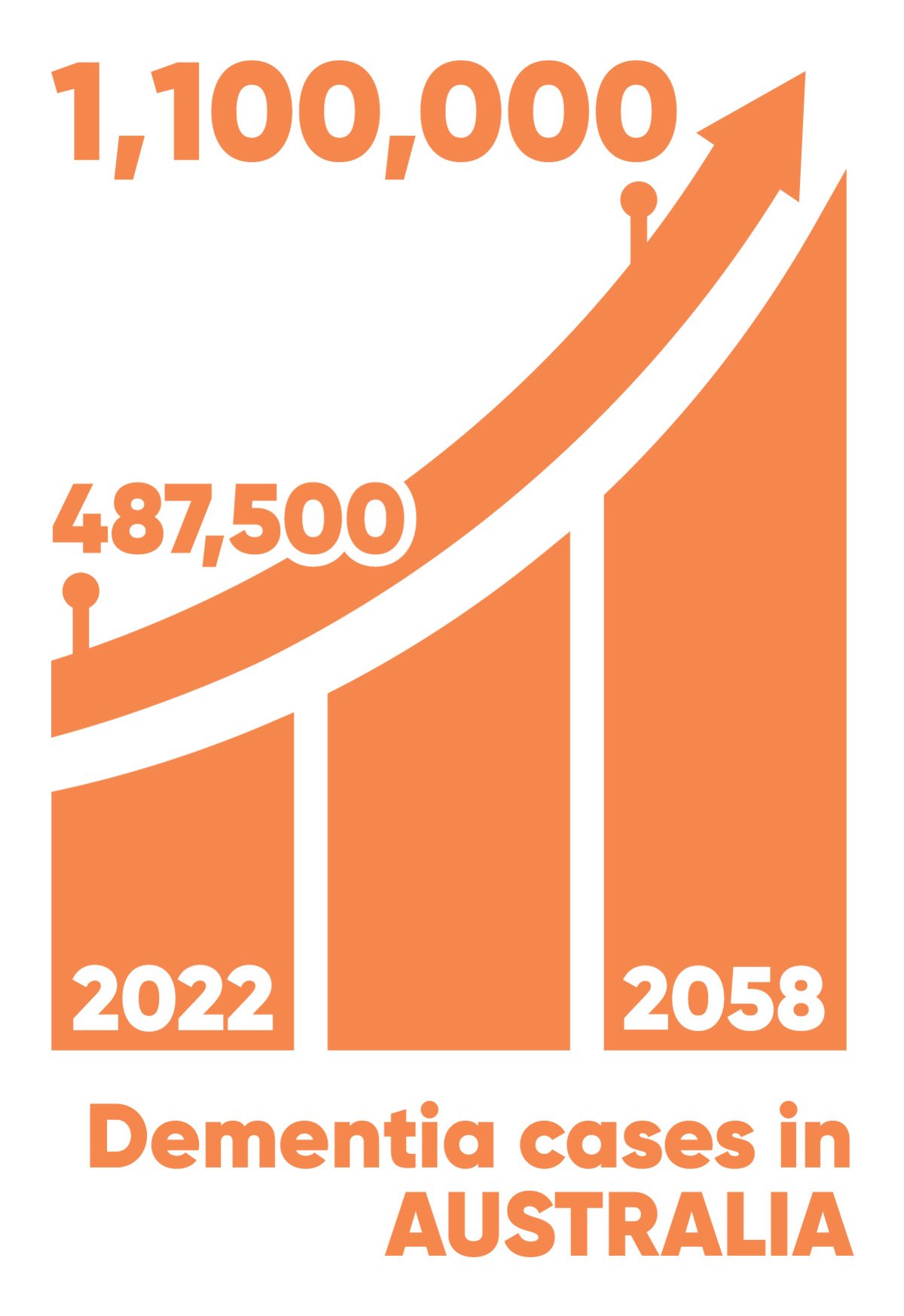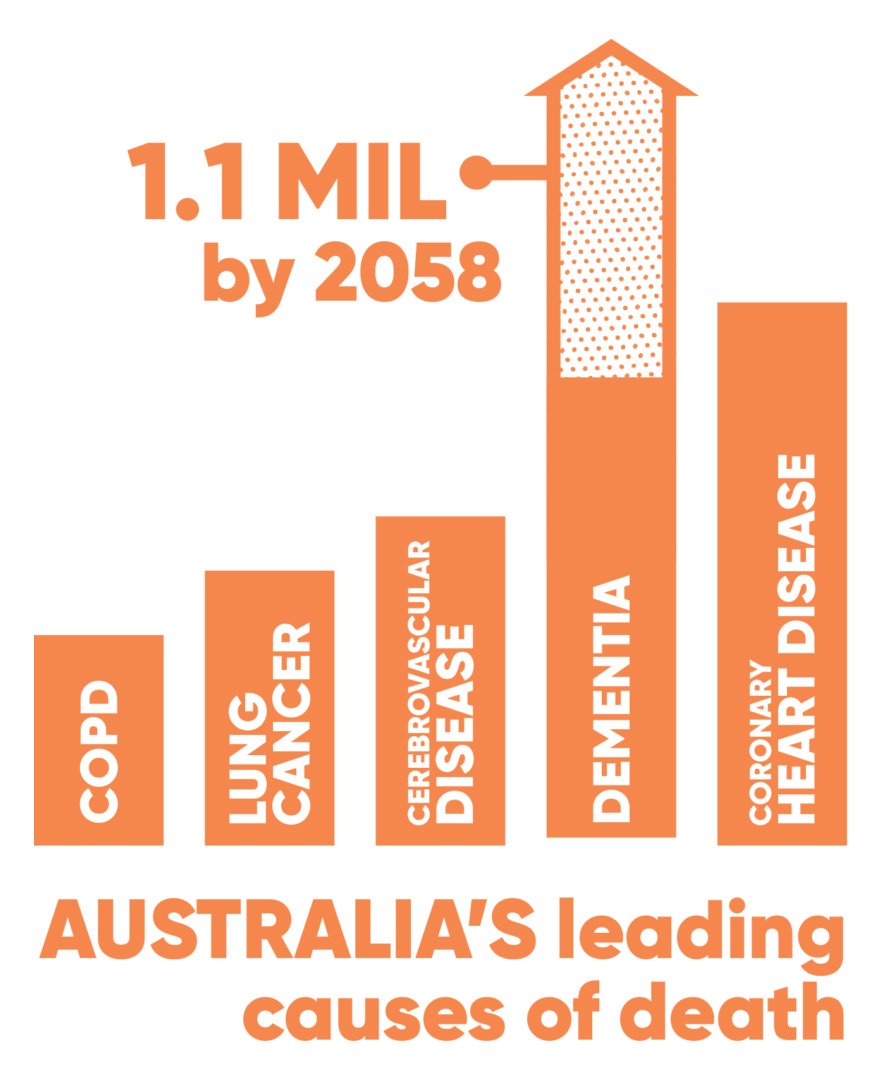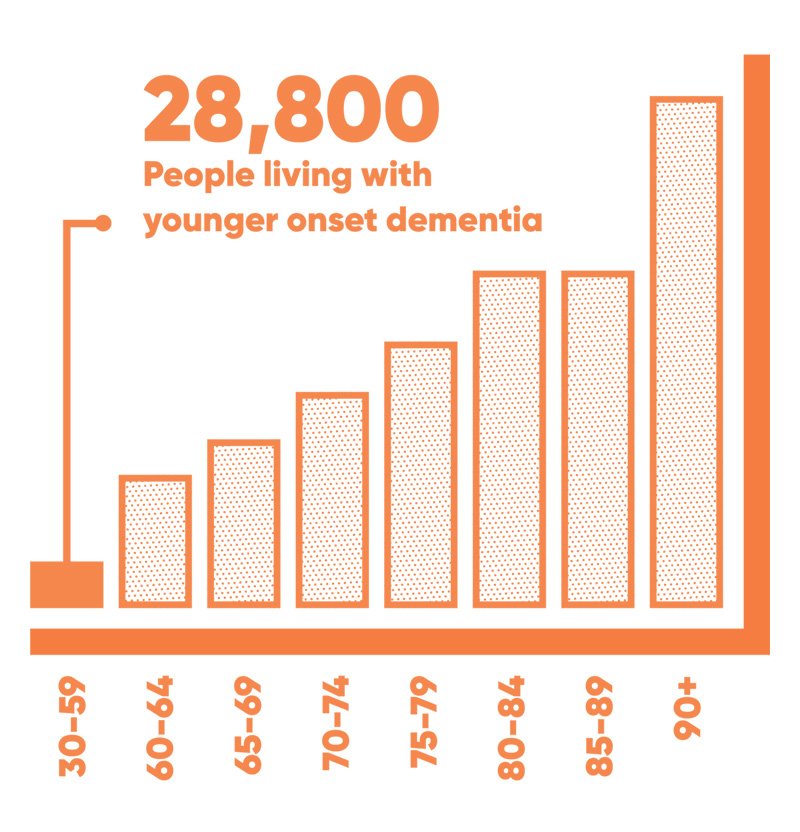Save Mum’s Memories
PIECING TOGETHER DEMENTIA

Joann was only in her mid 50’s when she was diagnosed with early onset Alzheimer’s disease.
At the time she had a career as a bank teller and had recently moved into her forever, dream home with her husband Les.
Joann prided herself on the quality of her work, so a new and alarming increase in errors indicated something was very wrong.
After many tests, Joanne was referred to Dr Eamonn Eeles who diagnosed her with early onset Alzheimer’s disease.
Imagine being Joann, finally being at a time in your life where you have a fulfilling career, living in your dream home and looking forward to doing more of the things you love, with the people you love.
Now imagine what it is like to receive a diagnosis of dementia – to have your whole future turned upside down.
![]()
Dementia is one of Australia’s most devastating diseases.
It is quickly becoming one of Australia’s biggest killers.
Donate today to support life-changing research into the early detection of dementia.
Dementia in Australia
![]()
An estimated 487,500 Australians are currently living with dementia
![]()
There are approximately 1.6 million people caring for someone with dementia
![]()
Dementia affects 1 in 4 people over the age of 85
![]()
Currently there is no single way to accurately diagnose dementia
![]()
Australia’s Unfolding Crisis
Dementia is now the second biggest killer of Australians.
Dementia is now Australia’s second leading cause of death, and the leading cause of death among women. It is a disease that everyone fears and wishes they, and their loved ones, could avoid. It seems everyone has a story of someone they know and love being struck down by this dreaded disease.
Loving grandparents who can no longer recognise the faces of their grandchildren, parents who can no longer remember if they ate or showered for the day, or partners who are becoming disoriented and even lost. The impacts of dementia are absolutely devastating.
Your Stories

“After a diagnosis of dementia, you do change your attitude to life. You live day-to-day because you don’t know what’s going to happen tomorrow.
I agreed to be part of Dr Eeles’ clinical trial because I wanted to do something to help, to do my bit and try and help others. The way I look at it, this isn’t about me, it’s about the future and other people not having to go through what I’m about to go through.”
Joann (57), diagnosed with early onset dementia

“Dementia is the cruellest disease in the world, and I am truly heartbroken with what it has done to my Mum.
I know deep down though, that even though she often doesn’t remember my name, or that I am even her daughter, she knows that we have a relationship, she knows that she loves me. What Mum remembers, and what Mum feels is love.
It would be miraculous if we could identify dementia early.”
Tish, daughter of Sylvia (dementia patient)

Without a medical breakthrough, there will be 1.1 million people living with dementia in the next 35 years.
Today there are almost half a million Australians living with dementia, and 1.6 million people involved in their care.
Many who are affected by this debilitating disease are unable to look after themselves and this burden often falls on their loved ones.
While looking after loves ones with dementia is deeply rewarding, at times the experience can also be distressing, exhausting and even terrifying.
With life expectancy continuing to increase, sadly even more people will be affected by this terrible disease in the years to come.

Each year, dementia claims even more lives than cancer.
When you think of dementia, do you usually associate it with a loss of memory? While most of us can appreciate the sadness and confusion that memory loss brings, there are in fact even more distressing symptoms of dementia.
Dementia degrades your cognitive abilities, health and leaves suffers at risk to countless other illnesses. Dementia is a killer, and one that claims even more lives than cancer each year.
An aging population and increasing life expectancy means it is only a matter of time until dementia becomes Australia’s leading cause of death.
10 Ways Dementia Affects You
![]()
Everyone forgets things sometimes, but those with dementia forget things more often and will fail to remember them.
It isn’t just losing memories, or being unable to recall the good ‘ole days.
Forgetting names, places and the faces of those you love are all effects of dementia.
We all have precious items you never want to lose. Those with dementia will lose things, or put them in inappropriate places where they will never be found.
Someone with dementia could accuse those they love of stealing from them.
The person with dementia can become incredibly fearful and suspicious, even of those closest to them.
Suffers of dementia can become lost or disoriented, even on the street they’ve lived on their whole lives.
They’ll forget who they are, where they are and how they got there – and how to get back to safety.
Dementia takes a terrible toll on the mind and body.
Sufferers can experience rapid and dramatic mood swings, and lash out at those around them.
When you have dementia, you don’t just forget to finish a job – you forget you started it in the first place.
That might mean forgetting about dinner on the stove, the medications you need to take or the washing in the machine.
Those with dementia often need significant assistance – not just with the big tasks, but the simple stuff also.
Forgetting the right words isn’t just frustrating – it’s scary too. Dementia can make you forget words, or use inappropriate ones when you least expect it.
Life can be overwhelming sometimes, but you always cherish the moments you have with those you love.
Those with dementia can lose interest in the world around them, and disengage easily. They can become passive, and often need others to prompt them to get involved.
Lots of every day tasks need good, quick judgement, like driving.
Someone with dementia can struggle to make sound judgements, and can end up putting themselves and others at risk
When you have dementia, it can be hard to keep yourself true to you.
People with dementia might hear or see something that is not there (hallucinations) or hold strong, but false beliefs (delusions) such as others are trying to steal their belongings or hurt them.
For family and friends trying to provide the best care they can, it can be like the person they know and love is lost forever, replaced by a stranger.
Dementia doesn’t just affect memory.
Someone with dementia may forget what a certain number or letter mean, and what to do with it.
The dangers of early onset dementia
Dementia doesn’t just affect the elderly
Today there are almost 30,000 people living with early onset dementia. People like Joann, who had her dream home, a fulfilling career, and bright plans for the future.
You might feel that dementia is a worry for the future, or something that will be cured long before your family is touched by it.
Sadly though, thousands more are diagnosed every year and the situation is worsening by the day. Dementia isn’t just a huge strain on our healthcare system – it’s a strain on families, friends, partners and children.
Without a significant breakthrough and better ways of detecting the disease, dementia will continue to have a devastating impact on all Australians.

Let’s piece together dementia
Your support can help develop ways to detect dementia early, and slow the devastating effects
Our researcher Dr Eamonn Eeles (Geriatrician and Head of Research of Internal Medicine Services at The Prince Charles Hospital) is working to free Australia from the fear of dementia.
His team is part of a world-first study mapping the brain to detect early signs of dementia. Previously, examining the brains of dementia patients could only occur after death. Now the scientists you support are able to see the physical indications of dementia within the brain.
Like scanning for a broken bone, these scans can identify if dementia markers have grown or remained consistent. Seeing the physical effects of dementia can help identify the differences between healthy brains and those showing early signs of dementia.
Their research into the early diagnosis of dementia could make the world of difference to dementia patients and their families.
An early diagnosis gives dementia sufferers more control over their diagnosis. Drug and non-drug treatment can also be more effective the earlier someone is diagnosed. It gives them access to the best medical knowledge about any interventions that can buy more time.
In a world where dementia is detected early, those diagnosed could receive interventions to slow the progression of the disease, giving them more time to plan ahead while they are still able to make important decisions.
This is the hope that Dr Eamonn Eeles and his team are providing.

“We directly measure chemical signals in the memory-forming part of the brain. This imaging, together with scans gives us the best look yet into the workings of the brain and enables us to better evaluate changes that happen with early onset of Alzheimer’s disease.”
Dr Eamonn Eeles, The Prince Charles Hospital
Why research into early dementia detection matters
![]()
Early detection gives sufferers the chance to have an active role in planning their future.
![]()
Early detection means progression of the disease can be tracked, and potentially slowed.
![]()
Knowing the early signs of dementia means better treatments can be developed, and better care given to patients.
![]()
Early diagnoses can help people with dementia reduce risk factors, and do things to keep their brain and body healthy.
The people we love and care for deserve the chance for a better life, a more dignified life and that is why early diagnosis of dementia is so important. With early recognition, the chances of slowing or halting the effects of dementia improve dramatically.
Our hope is that with your donation, research will one day soon lead to the development of a drug that can treat and prevent this insidious disease. You have the opportunity to help more people in our community benefit from early detection and treatment.
With your support, and the brilliant minds of Dr Eamonn’s team, one day soon we may be able to stall or prevent this insidious disease.

I agreed to be part of Dr Eeles’ clinical trial because I wanted to do something to help, to do my bit and try and help others. The way I look at it, this isn’t about me, it’s about the future and other people not having to go through what I’m about to go through.
Joann (57), diagnosed with early onset dementia

I know deep down though, that even though she often doesn’t remember my name, or that I am even her daughter, she knows that we have a relationship, she knows that she loves me. What mum remembers, and what mum feels is love.
It would be miraculous if we could identify dementia early.
Tish, daughter of diagnosed dementia patient
You can stop Dementia
Your donation can change the lives of millions of Australians.
Dementia has quickly become one of Australia’s most devastating diseases.
Early detection and prevention is the key, and only you can help researchers make that breakthrough.
Donate today and support the life-changing work done by Dr Eamonn Eeles and his research team. Together, we’ll piece together dementia.
![]()
Your donation will fund life-saving research into the early detection of Australia’s most devastating disease, dementia.

